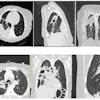Stripping some oral bacteria of their access to other pathogenic oral bacteria could help prevent periodontal disease and tooth loss, according to a new study in Microbiology (February 1, 2012).
The study findings suggest that this bacterial access key could be a drug target for people who are at high risk of developing periodontitis.
An oral bacterium called Treponema denticola frequently gangs up in communities with other pathogenic oral bacteria to produce biofilm in the oral cavity. It is this interaction between different oral pathogens that is thought to be crucial to the development of periodontal disease.
Now researchers from the University of Bristol have discovered that a molecule on the surface of T. denticola called chymotrypsin-like protease (CTLP) acts as the key pass that grants the bacterium access to the community, by allowing it to latch onto other oral bacteria. Once incorporated, CTLP in conjunction with other bacterial molecules can start to wreak havoc by inhibiting blood clotting and causing tissue destruction.
The study shows that CTLP could be a good target from which novel therapies could be developed.
"CTLP gives Treponema access to other periodontal communities, allowing the bacteria to grow and survive," the study authors wrote. "Inhibiting CTLP would deny Treponema access to the bacterial communities responsible for dental plaque, which in turn would reduce bleeding gums and slow down the onset of periodontal disease and tooth loss."
The team is now working to find a compound that will inhibit CTLP. "If a drug could be developed to target this factor, it could be used in people who are at higher risk from developing gum disease," said lead author Howard Jenkinson, PhD.



















